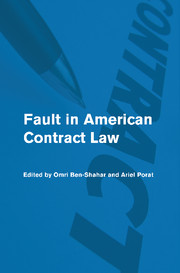Book contents
- Frontmatter
- Contents
- List of Contributors
- Preface
- Acknowledgment
- I THE CASE FOR STRICT LIABILITY
- II THE CASE FOR FAULT
- III BETWEEN STRICT LIABILITY AND FAULT
- IV WILLFUL BREACH
- 10 When Is a Willful Breach “Willful?” The Link Between Definitions and Damages
- 11 Willful Breach: An Efficient Screen for Efficient Breach
- 12 An Information Theory of Willful Breach
- 13 Contract Law and the Willfulness Diversion
- V COMPARATIVE FAULT
- VI THE MORALITY OF BREACH
- Case Index
- Subject Index
- References
10 - When Is a Willful Breach “Willful?” The Link Between Definitions and Damages
Published online by Cambridge University Press: 10 November 2010
- Frontmatter
- Contents
- List of Contributors
- Preface
- Acknowledgment
- I THE CASE FOR STRICT LIABILITY
- II THE CASE FOR FAULT
- III BETWEEN STRICT LIABILITY AND FAULT
- IV WILLFUL BREACH
- 10 When Is a Willful Breach “Willful?” The Link Between Definitions and Damages
- 11 Willful Breach: An Efficient Screen for Efficient Breach
- 12 An Information Theory of Willful Breach
- 13 Contract Law and the Willfulness Diversion
- V COMPARATIVE FAULT
- VI THE MORALITY OF BREACH
- Case Index
- Subject Index
- References
Summary
The existing literature on willful breach has not been able to define what should count as “willful.” This chapter argues that any definition we adopt has implications for just how high damages should be raised in those cases where a breach qualifies as willful. As a result, both of these issues – the definition of “willful” and the measure of damages for willful breach – need to be considered simultaneously. Specifically, if a definition of “willful” excludes all breachers who behaved efficiently, then in theory we can raise the penalty on the remaining inefficient breachers to any arbitrarily high level (“throw the book at them”). But if, instead, a given definition of willful would catch even some efficient breachers in its net, the damages assessed against willful breachers should be more limited. In that case, damages for willful breach might still justifiably be raised, but they should be raised only to the level that is economically efficient.
Liability for breach of contract is often described as a form of strict liability, in which the measure of damages is unaffected by the culpability of the breach. However, courts sometimes do award higher damages, under various legal doctrines, if the behavior of the breacher seems especially culpable. When they do, they may describe the breacher's behavior using labels such as willfully, or in bad faith, or fraudulently, or maliciously or, as Dickens once put it, “otherwise evil-adverbiously.”
- Type
- Chapter
- Information
- Fault in American Contract Law , pp. 147 - 160Publisher: Cambridge University PressPrint publication year: 2010
References
- 4
- Cited by



